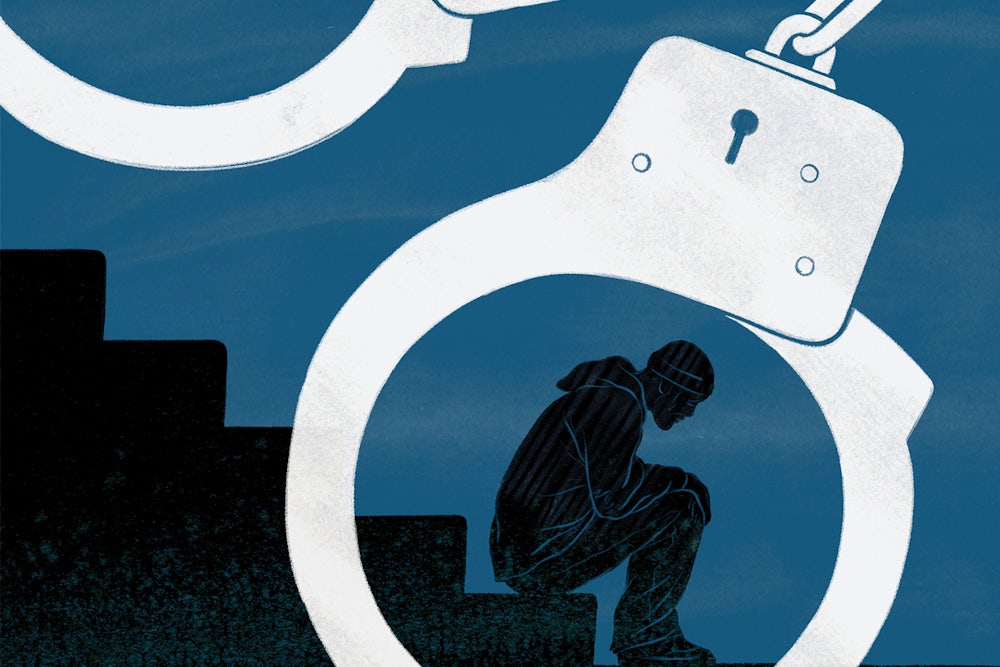The criminalization of poverty in the United States has a wide sweep. In the four years since Michael Brown was killed in Ferguson, Missouri, countless stories have come to light about the fees and fines imposed by courts for minor violations; about driver’s license suspensions that push people into unemployment; and the ways in which money bail often traps the innocent, forcing guilty pleas from people who can’t raise the cash.
But it extends further than that. Today, in the United States, the poor are often punished simply because they are poor, and especially if they are people of color. Low-income children are arrested for minor schoolyard scuffles instead of being sent to the principal’s office. Recipients of public benefits are charged with fraud because they made mistakes filling out government forms. Cities use vagrancy laws to banish the homeless. And in an estimated 2,000 local municipalities across 44 states, police can order landlords to evict people they consider “chronic nuisances” because they rack up a certain number of petty infractions as small as forgetting to cut their grass, leaving garbage out on their property, or having practically any arrest on their record.
These “chronic nuisance” or “crime-free” ordinances are some of the most troubling examples of the criminalization of poverty. In the United States, they date to the 1980s and the War on Drugs, when city councils first began allowing police to seize crack houses without a trial. Over time, the laws proliferated and evolved, and today, police departments have wide latitude to choose when and where to enforce the ordinances. Too often they are turned on victims, rather than on their assailants.
Take Lakisha Briggs, a certified nurse’s assistant in Norristown, Pennsylvania. In 2012, Norristown classified anyone who called 911 three times in four months a “nuisance.” In April of that year, after several 911 calls, the police came to arrest Briggs’s abusive boyfriend, but they warned her that if she called again she and her daughter would be evicted; even calls from concerned neighbors would count against her. Later, when her former boyfriend returned from prison, he continued the abuse. “I had no choice but to let him stay,” she told a reporter. That June, when he knocked her unconscious and stabbed her in the neck with a shard of glass from a shattered ashtray, she still refused to call the police and ended up wandering outside until someone saw her and called a trauma team to medevac her to a nearby hospital. A few days later, she was evicted.
Norristown isn’t the only example. In 2012, Matthew Desmond, author of the prize-winning book Evicted, studied 59 cities across the country and found they all had nuisance ordinances: 39 included assault, sexual abuse, battery, or domestic violence as potential reasons for eviction; only four explicitly stated that victims of domestic violence could not be evicted for calling 911 too many times. In Illinois, a state whose cities and towns have roughly 110 crime nuisance ordinances, Kate Walz of the Sargent Shriver National Center on Poverty Law has seen them invoked not only against victims of domestic violence, but also against people with loved ones who have threatened to commit suicide or children who tried to run away.
Race is at the heart of this issue, as it is for so many things in this country. Maplewood, Missouri’s housing ordinances—which allow the police not only to label people “nuisances” but to ban them from living anywhere within the city limits for up to six months—are disproportionately invoked against African Americans. Rosetta Watson, for example, a 53-year-old African American woman with disabilities, was kicked out of the city in 2012 after she called 911 four times (she’d been punched, shoved, and choked by her boyfriend). Between 2010 and 2015, at least 44 percent of people evicted from Maplewood were African American—this in a city that is just 17 percent black.
The 40 largest cities in the United States:
93 percent have nuisance ordinances
Ones that consider 911 calls a nuisance:
Albuquerque
Boston
Chicago
Fresno
Milwaukee
Time—and extreme examples like Briggs’s—have forced some cities to change their laws. Briggs sued Norristown, and with help from the ACLU and pressure from local media, she received a $495,000 settlement in September 2014. The city repealed the ordinance and promised not to revive it. That November, Pennsylvania implemented a law banning local police from interfering with the right to contact them for help. And Watson is suing Maplewood, represented by the ACLU of Missouri. So is Washington civil rights attorney John Relman. Still, according to the ACLU, municipalities are increasingly enacting new nuisance ordinances across the country.
Under President Obama, the government brought national attention to this issue, as well as to the criminalization of poverty more generally. The Department of Justice sued or wrote amicus briefs when the Constitution or a federal statute was violated. It investigated police departments, prisons, and jails, and sent administrative guidances—nonbinding documents that offer legal and policy advice—to state and local governments. In September 2016, the Department of Housing and Urban Development called on local governments to repeal nuisance ordinances that “create disparities in access to emergency services” or risk violating the Fair Housing Act. But that was Obama. This is Trump.
In February, Jeff Sessions’s Justice Department announced that it would no longer press local municipalities to comply with federal guidance documents. And while the federal government might, under Obama, have sued a city like Maplewood for violating the Fair Housing Act, to say nothing of the Constitution, under Trump, it most likely will not. On the issue of chronic nuisance ordinances, as with criminalization of poverty across the board, activists will have to move forward without federal help. And lawyers, legislators, the judiciary, journalists, and others have to help pick up the slack.
